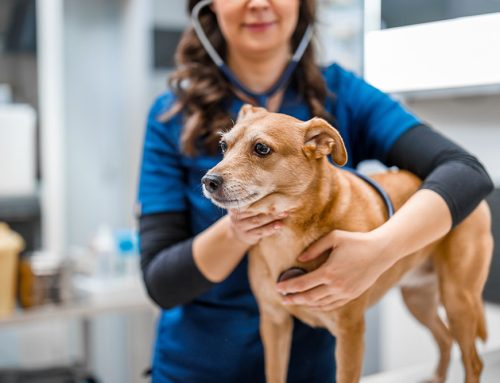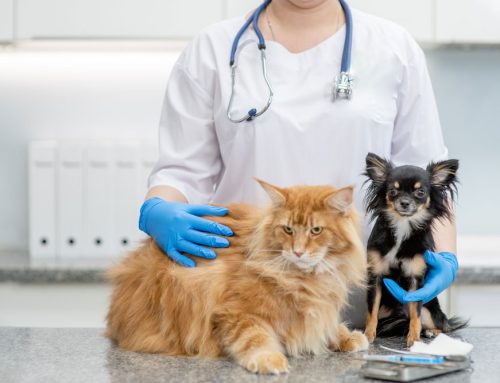Understanding Stress and Anxiety in Pets
As dedicated veterinarians, we understand the importance of identifying stress and anxiety in pets. Early recognition of these signs is crucial in preventing more severe health issues and improving your pet’s quality of life. This guide will help you recognize and address signs of stress and anxiety in dogs and cats.
Identifying Signs of Stress and Anxiety in Dogs
Behavioral Changes
Dogs can exhibit numerous behavioral changes when experiencing stress or anxiety. These may include excessive barking or whining, often in response to unfamiliar or uncomfortable situations. Pacing or restlessness is another frequent sign, often seen in dogs who feel anxious or are unable to relax in their environment. Unexpected aggression can also indicate stress or anxiety, especially if it’s a new behavior.
From a medical standpoint, these behaviors can escalate into more serious conditions if not addressed promptly. Chronic stress can lead to gastrointestinal disorders, such as diarrhea and vomiting, common in anxious dogs. Stress can also exacerbate pre-existing conditions like allergies or skin irritations, potentially leading to chronic skin infections.
Physiological signs are equally telling, including excessive panting and drooling, which occur even in cool temperatures. These symptoms might indicate an underlying issue with the dog’s adrenal system, as chronic stress can lead to an overproduction of cortisol, known as the “stress hormone.” Increased shedding may also be a stress indicator. If you notice any of these signs, consider scheduling a behavior consultation.
Environmental Triggers and Dog Anxiety
Changes in a dog’s environment, such as moving to a new home or the arrival of new pets or family members, can significantly impact their mental health. Environmental stress can be mitigated by maintaining a stable environment and introducing changes gradually. For instance, when introducing a new pet, allow for a slow and controlled meeting process in a neutral space to minimize territorial tension. For tips on adapting your home to better suit your pet’s needs, see our guide on pet-proofing your home.
Recognizing Stress and Anxiety in Cats
Signs of Stress in Cats
Cats often show stress differently than dogs. Common indicators include hiding more than usual or displaying changes in litter box habits, such as going outside the box. Increased scratching or changes in interaction, such as avoiding contact or becoming clingy, can also indicate stress. Furthermore, watch for changes in eating or grooming behavior; over-grooming or under-grooming can both be responses to stress.
These stress signs can lead to destructive behaviors like furniture scratching or urine marking. Medically, stress in cats can lead to urinary tract issues, such as feline idiopathic cystitis, often exacerbated by anxiety.
Routine and Environment in Cat Anxiety
Cats are particularly sensitive to changes in their routine or environment, which can cause significant stress. Maintaining a consistent schedule and a calm, stable home environment are crucial for their well-being. Feeding your cat at the same time each day and providing quiet, private spaces can help reduce anxiety. If you’re looking for ways to create a more enriching space for your cat, consider scheduling a consultation for environmental enrichment services at our clinic. Introducing interactive toys or cat trees can also provide mental stimulation and physical exercise, reducing stress levels.
Helping Your Pet Manage Stress and Anxiety
Practical Tips for Reducing Pet Anxiety
To help manage your pet’s anxiety, establish a regular routine that includes consistent feeding times, exercise, and quiet times. Calming products like pheromone diffusers or anti-anxiety clothing can also be beneficial. These tools work by mimicking natural calming pheromones, which can help soothe your pet in stressful situations. Physical activity helps to burn off excess energy and produces calming endorphins. Additionally, consider dietary changes that may help alleviate anxiety, and consult the AAHA Nutrition and Weight Management Guidelines for advice.
Professional Interventions for Severe Cases
In cases where anxiety or stress is severe, professional intervention might be necessary. Treatments can range from behavioral therapy to medication. Cognitive-behavioral therapy can help modify the pet’s response to stressors, while medications such as selective serotonin reuptake inhibitors (SSRIs) can be used under veterinary supervision for more severe cases. Understanding when to seek help is crucial, and our team is here to support you. For severe cases, consider Make an Appointment with us. For more information on handling separation anxiety, explore this resource on separation anxiety in pets.

FAQ
Q: What are the long-term effects of untreated anxiety in pets?
A: Long-term untreated anxiety can lead to chronic health issues, including heart disease, gastrointestinal problems, and a weakened immune system. Behaviorally, it can result in persistent destructive behaviors and a reduced quality of life.
Q: How can I tell if my pet’s anxiety is an emergency?
A: An anxiety emergency might manifest as self-harm behaviors, such as chewing or licking to the point of injury, or severe aggression that poses a risk to the pet or others. In such cases, immediate veterinary attention is required.
Why Choose Southern Crossing Animal Hospital
At Southern Crossing Animal Hospital, we pride ourselves on our commitment to the health and well-being of your pets. Our full service, privately-owned hospital is staffed by experienced professionals who are deeply involved in the Memphis pet owner community. Our veterinarians are trained in the latest anxiety management techniques and can provide personalized care plans tailored to your pet’s specific needs. To learn more about our clinic and our team, please visit Our Legacy or check out our Practitioner of the Year page.
Recognizing the signs of stress and anxiety in your pet is the first step toward helping them live a happier, healthier life. If you have concerns about your pet’s behavior or health, contact us to schedule a consultation. We are here to help every step of the way, providing expert care and heartfelt support.








Leave A Comment